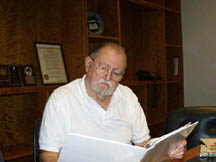When he was eight years old, Tommy Riggs was stricken with polio, and a transistor radio became his best companion. Riggs eventually went into the security business. His work took him to California, where one of his alarm system clients was a radio station. In his spare time, Riggs would visit the Santa Monica station and learn the inner workings of the business. “It was like a labor of love,” Riggs said last week. Now he is 66 and has since retired, Riggs wants to return to his radio days. He has created the idea for WJCR, a community radio station for and by the people of Jersey City. The mission statement is “bringing back traditional values,” and Riggs says the station would be geared to providing seniors and children with wholesome entertainment and educational services. When the Friends of Zabriskie Street Library called for an open house to field ideas on improving and making better use of the library, Riggs jumped at the chance to introduce his idea. “In the beginning, everything looked positive,” Riggs said. Riggs charges that when he presented his ideas to the Jersey City Free Public Library, he was originally met with interest in housing the station in the Hudson City branch, which will be closing for renovations later this month. But when it came time to start working on the station, Riggs said that he was met with nothing but obstacles put up by the library. “Unfortunately, the station is not on now because politics has made it that way,” Riggs said. On one occasion, Riggs said that the space he was looking to use for the radio studio was cluttered with hundreds of steel shelving units, making it impossible to use. Library officials did not return calls on the subject. “We were going to do programming to get children off the street, six days a week,” Riggs said. “To keep kids busy until their parents come home.” Riggs believes that programming such as the original “Lone Ranger” radio shows, combined with newer “Star Wars” episodes, may pull children off the street corners. Riggs has access to thousands of tapes of the original radio shows from the “golden age” that older residents may remember listening to before television became the norm. A big part of the radio station’s purpose would be to bring certain aspects of the library into the homes of seniors unable to get to the library. Also included in whom Riggs is trying to target is the blind population, some of whom depend on radio as their only form of electronic entertainment. “Some of those programs would be geared for people who can’t read,” Riggs said. “Or people who can read, but may not be able to turn the page on their own anymore.” During the day, according to prospective programming sheets, the majority of daytime broadcasts would be geared towards senior citizens. Riggs said that through his radio contacts, he presently has access to 11,000 LPs and over 100,000 complete radio shows from 1929 to the cutoff date he has set at 1955. “That’s when the music gets a little hairy for the seniors,” Riggs said. Riggs has received letters of intent from hopeful employees already, and fields resumes from actors each day, he said. “We’re not even on the air yet,” Riggs said, “but every day we get calls because the word is out. There is a lot of interest out there.” The greatest challenge Riggs said he faces is raising money to privately fund the radio station. For two and a half years, the project has gotten stale, and Riggs’ debts continue to grow. He said that he has borrowed more than $62,000 from friends and contacts, which he has spent on the beginning stages of the station. Most of that money appears to have gone to office expenses and securing the audio carts that will eventually make up the station’s programming. “I want to do this with the community,” Riggs said, “even if I have to sell shares for $1 each so everyone can be involved.” According to Riggs, the number-one priority of WJCR is to find space to set up a studio. From there, he said that he could begin the process of acquiring the necessary equipment to broadcast a signal through the city. Unfortunately, the process has been a long and tedious one for Riggs. He said that as each day passes, people get older and the project gets harder for him to put together. “People were dying, waiting for things to happen,” Riggs said, of the dwindling pool of talent from the early days of radio on which the fundamentals for WJCR are based. Riggs claims to have many past actors and technicians, retired and living nearby, interested in volunteering to work on the college campus-type station. Because the process has yet to get off the many pages of notes and ideas Riggs carries with him, many may never get to see the final result of his efforts.
Our Digital Archive from 2000 – 2016
